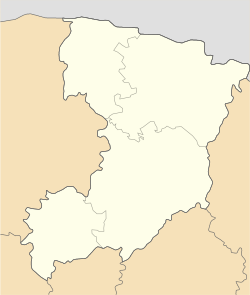Zdolbuniv
This article needs additional citations for verification. (November 2018) |
Zdolbuniv
Здолбу́нів Zdołbunów | |
|---|---|
 Skyline of Zdolbuniv | |
| Coordinates: 50°30′34″N 26°15′35″E / 50.50944°N 26.25972°E | |
| Country | |
| Oblast | |
| Raion | Zdolbuniv Raion |
| First mentioned | 1497 |
| Population (2017) | |
| • Total | 24,852 |
Zdolbúniv (Ukrainian: Здолбу́нів, Russian: Здолбунов, Polish: Zdołbunów) is a small city in Rivne Oblast (province) of western Ukraine. It is the administrative center of Zdolbuniv Raion (district), and has an important railway station and cement plant (there is a deposit of chalk). Population: 24,852 (2017 est.)[1]
History
The town was mentioned in 1497 in the deed, in which the Lithuanian Grand Duke and future King of Poland Alexander Jagiellon committed several villages to Prince Konstanty Ostrogski. Among the villages mentioned in the deed was Dolbunov. The town has had its present name of Zdolbuniv since 1629. In 1569, following the Union of Lublin, Zdolbuniv became part of the Kingdom of Poland, where it remained for over 200 years, until the Partitions of Poland. In 1793, it was annexed by the Russian Empire, and in the interbellum period, it again belonged to Poland. It was a powiat (country) centre in Wołyń Voivodeship during this period. Zdolbunow, as it was then known, was an important rail hub, located near the Polish-Soviet border. The town had a mixed Polish-Ukrainian-Jewish population.
In September 1939, following the Soviet Invasion of Poland, Zdolbunow was captured by the Soviet Union, where it remained until the Operation Barbarossa. Its Jewish minority perished in the Holocaust, and in late 1943, Zdolbunow became a shelter for ethnic Polish population of Volhynia, escaping the Volhynian Genocide. On February 3, 1944, the town was captured by the Red Army.
Zdolbuniv is the birthplace of a contemporary Polish painter Stanislaw Fijalkowski (born 1922), and singer Teresa Tutinas (born 1943)
Gallery
-
St.Katherine Church
-
St.Peter & Paul Kostel
-
House of culture
-
Stepan Bandera monument in Zdolbuniv
-
Bust of Ulas Samchuk
-
Graves of warriors of Ukrainian People's Republic
-
Memorial and common grave of Polish warriors
-
Memorial of World War II warriors
-
Common grave of World War II warriors
-
Zdolbuniv railway station
-
Zdolbuniv cement factory
References
- ^ "Чисельність наявного населення України (Actual population of Ukraine)" (in Ukrainian). State Statistics Service of Ukraine. Retrieved 26 August 2017.













